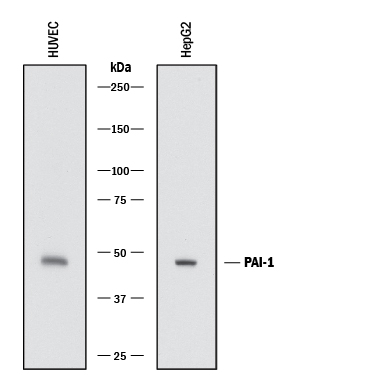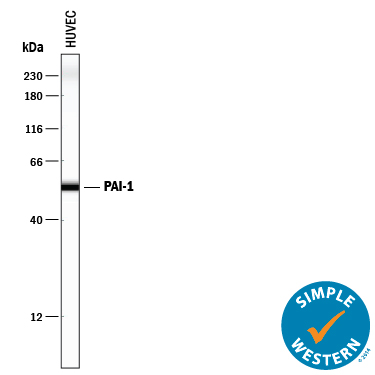Human Serpin E1/PAI-1 Antibody
Human Serpin E1/PAI-1 Antibody Summary
Met1-Pro402
Accession # NP_000593
Applications
Please Note: Optimal dilutions should be determined by each laboratory for each application. General Protocols are available in the Technical Information section on our website.
Scientific Data
 View Larger
View Larger
Detection of Human Serpin E1/PAI‑1 by Western Blot. Western blot shows lysates of HUVEC human umbilical vein endothelial cells and HepG2 human hepatocellular carcinoma cell line. PVDF membrane was probed with 0.5 µg/mL of Rabbit Anti-Human Serpin E1/PAI-1 Monoclonal Antibody (Catalog # MAB17861) followed by HRP-conjugated Anti-Rabbit IgG Secondary Antibody (Catalog # HAF008). A specific band was detected for Serpin E1/PAI-1 at approximately 48 kDa (as indicated). This experiment was conducted under reducing conditions and using Immunoblot Buffer Group 1.
 View Larger
View Larger
Detection of Human Serpin E1/PAI‑1 by Simple WesternTM. Simple Western lane view shows lysates of HUVEC human umbilical vein endothelial cells, loaded at 0.2 mg/mL. A specific band was detected for Serpin E1/PAI‑1 at approximately 55 kDa (as indicated) using 5 μg/mL of Rabbit Anti-Human Serpin E1/PAI‑1 Monoclonal Antibody (Catalog # MAB17861). This experiment was conducted under reducing conditions and using the 12-230 kDa separation system. Non-specific interaction with the 230 kDa Simple Western standard may be seen with this antibody.
Reconstitution Calculator
Preparation and Storage
- 12 months from date of receipt, -20 to -70 °C as supplied.
- 1 month, 2 to 8 °C under sterile conditions after reconstitution.
- 6 months, -20 to -70 °C under sterile conditions after reconstitution.
Background: Serpin E1/PAI-1
As a member of the Serpin superfamily of serine protease inhibitors, Serpin E1/PAI‑1 is the principal inhibitor of urokinase‑type plasminogen activator (uPA) and tissue‑type PA (1, 2). As important regulators of extracellular matrix remodeling, uPA and PAI‑1 play a major role in many processes such as angiogenesis, tumor invasion and obesity (2‑4). For example, uPA and PAI-1 are the only tumor prognostic factors validated at the highest level of evidence with regard to their clinical utility in breast cancer (5). The human PAI-1 is initially synthesized as 402 amino acid precursor with a N‑terminal signal peptide (6, 7). PAI‑1 may exist in one of two possible conformations, designated as active or latent (8). The purified rhPAI‑1 is active against rhuPA. The heterogeneity at the N‑terminus of the purified recombinant human PAI‑1 has been observed before for both the recombinant and native proteins (9).
- Silverman, G.A. et al. (2001) J. Biol. Chem. 276:33293.
- Stefansson, S. et al. (2003) Curr. Pharm. Des. 9:1545.
- Duffy, M.J. (2002) Clin. Chem. 48:1194.
- Juhan-Vague, I. et al. (2003) J. Thromb. Haemost. 1:1575.
- Harbeck, N. et al. (2002) Clin. Breast Cancer 3:196.
- Pannekoek, H. et al. (1986) EMBO J. 5:2539.
- Ginsburg, D. et al. (1986) J. Clin. Invest. 78:1673.
- Wang, Z. et al. (1996) Biochemistry 35:16443.
- Stromqvist, M. et al. (1994) Protein Expr. Purif. 5:309.
Product Datasheets
FAQs
No product specific FAQs exist for this product, however you may
View all Antibody FAQsReviews for Human Serpin E1/PAI-1 Antibody
Average Rating: 5 (Based on 1 Review)
Have you used Human Serpin E1/PAI-1 Antibody?
Submit a review and receive an Amazon gift card.
$25/€18/£15/$25CAN/¥75 Yuan/¥2500 Yen for a review with an image
$10/€7/£6/$10 CAD/¥70 Yuan/¥1110 Yen for a review without an image
Filter by:


